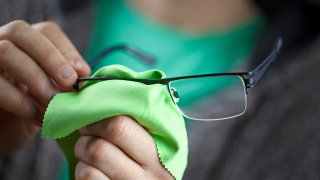
Amid all the warnings about contaminated surfaces possibly spreading the new coronavirus, many people may not be aware of a “surface” they’re touching all day: their glasses.
When going out in public, prescription specs or sunglasses can serve as a kind of barrier between the wearer and strangers who are coughing or sneezing, with the respiratory droplets landing on the lenses.
The virus can persist on glass for up to four days, one study found. It can also be detected for up to two to three days on plastic and stainless steel — materials that may be used in lenses and frames.
People often take glasses on and off all day, potentially transferring more of the virus onto their specs with their hands. Some rub their eyes after handling glasses or put the tips of the frame into their mouths, potentially exposing them to the pathogen.
Dr. Barbara Horn, president of the American Optometric Association, said she’s become much more conscious of the cleanliness of her eyewear during the pandemic.
“It’s very important,” Horn, an optometrist who lives in Myrtle Beach, South Carolina, told TODAY.
“I’m certainly not saying glasses are the main culprit by any means, but you just always want to be careful — making sure you’re cognizant of the fact that glasses can transfer (the virus) and be aware of how to clean them properly.”
Here are Horn’s tips for disinfecting glasses:
Clean your glasses after being out in the public:
Horn doesn’t need prescription glasses, but wears sunglasses constantly and makes sure to clean them after a trip to the grocery store or other places where she's around other people.
“Every time I walk in my home, the first thing I do is… wash my hands and then wash my glasses,” Horn said.
Soap and water are the best option
The new coronavirus is very sensitive to all soaps, said Dr. Joseph Vinetz, an infectious disease doctor at Yale Medicine in New Haven, Connecticut.
- Always rinse the lenses first with water to avoid grinding any particles that may be on the surface into the glasses and scratching them, Horn advised.
- Put a drop or two of soap, like dish soap, onto the lens and rub it around lightly with a microfiber cloth.
- Disposable lens cleaning wipes can work, too.
- Make sure to clean the nose pads, which touch the face constantly and can get dirty, and the edge where the lens meets the frame: “Lots of dust and debris can get trapped in that little space,” Horn said.
- Don’t forget to clean the frame, including the earpiece that goes behind the ear.
- Rinse and dry with a soft cloth. Avoid using paper towels, which have fibers that can easily scratch lenses. If using a non-disposable cloth to clean glasses, wash that cloth as well after cleaning the specs.
- It’s the same procedure for sunglasses.
Don’t worry about the little screws in the frame rusting if you wash your glasses. It shouldn’t happen if you let the frame air dry, plus screws can be easily replaced, so that shouldn’t be a concern, Horn said.
Don’t blow on glasses to clean them
Many people use their breath to steam up the lenses to try to clean them. “Especially right now, you don’t want to breathe on your glasses,” Horn said, to avoid putting any germs on them.
Don’t use rubbing alcohol or bleach
These cleaning agents can be harsh on anti-reflective or non-glare coatings on lenses, Horn cautioned. They could also make the frame more brittle. Stick to soap and water.
Household disinfecting wipes should be OK to use occasionally on frames, but again, skip the lenses, she advised.
Don’t put the frames in your mouth
It’s a common habit, but it’s not a good idea since frames may be germy and potentially lead to an infection, “especially during these times,” Horn said.
The same goes for rubbing your eyes, especially since coronavirus can enter the body through them, binding to receptors on the surface of the eyes and spreading throughout the body, NBC News medical correspondent Dr. John Torres told TODAY.
Another reason: People can actually go blind from rubbing their eyes because they can break down the front layer of the cornea, Horn warned.
Bottom line:
Touching glasses can potentially spread germs so cleaning them throughout the day — especially during a pandemic — would be ideal, Horn said.
This story first appeared on TODAY.com. More from TODAY:

